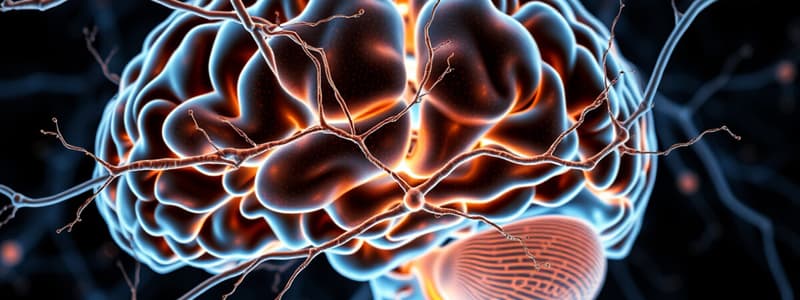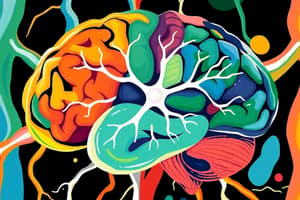Podcast
Questions and Answers
What is the basic structural unit of the nervous system?
What is the basic structural unit of the nervous system?
neuron
The neuron consists of a cell body which contains the ______.
The neuron consists of a cell body which contains the ______.
nucleus
What are the nerve fibers called that carry impulses towards the cell body?
What are the nerve fibers called that carry impulses towards the cell body?
dendrites
What is the single nerve fiber called that carries impulses away from the cell body?
What is the single nerve fiber called that carries impulses away from the cell body?
What is the lipid called that covers the axons?
What is the lipid called that covers the axons?
What are the 3 functions of the myelin sheath?
What are the 3 functions of the myelin sheath?
What is a synapse?
What is a synapse?
What are neurotransmitters?
What are neurotransmitters?
What are ventricles?
What are ventricles?
What is the largest part of the brain that controls reasoning, thought, memory, speech, sensation, sight, hearing & voluntary movement?
What is the largest part of the brain that controls reasoning, thought, memory, speech, sensation, sight, hearing & voluntary movement?
What conducts impulses between parts of the brain and is involved in eye reflex actions?
What conducts impulses between parts of the brain and is involved in eye reflex actions?
What conducts messages to other parts of the brain and is involved in reflex actions such as respiration, chewing, tasting & producing saliva?
What conducts messages to other parts of the brain and is involved in reflex actions such as respiration, chewing, tasting & producing saliva?
What is involved in the coordination of muscles, balance, posture, and muscle tone?
What is involved in the coordination of muscles, balance, posture, and muscle tone?
What is the lowest part of the brain stem that connects to the spinal cord?
What is the lowest part of the brain stem that connects to the spinal cord?
What carries sensory and motor messages?
What carries sensory and motor messages?
What are the 3 membranes that cover the brain and spinal cord?
What are the 3 membranes that cover the brain and spinal cord?
What do cerebrospinal fluid serve as and what are its two functions?
What do cerebrospinal fluid serve as and what are its two functions?
The peripheral nervous system consists of the ________ and the ________ nervous systems.
The peripheral nervous system consists of the ________ and the ________ nervous systems.
How many pairs of cranial and spinal nerves does the somatic system consist of?
How many pairs of cranial and spinal nerves does the somatic system consist of?
What is the sympathetic nervous system known for?
What is the sympathetic nervous system known for?
What is the parasympathetic nervous system known for?
What is the parasympathetic nervous system known for?
What does the sympathetic nervous system do to heart rate, respirations, and blood pressure?
What does the sympathetic nervous system do to heart rate, respirations, and blood pressure?
What effects does the parasympathetic nervous system have on heart rate, respirations, and blood pressure?
What effects does the parasympathetic nervous system have on heart rate, respirations, and blood pressure?
What does the sympathetic nervous system do to digestive activity?
What does the sympathetic nervous system do to digestive activity?
What effect does the parasympathetic nervous system have on digestive activity?
What effect does the parasympathetic nervous system have on digestive activity?
What is homeostasis?
What is homeostasis?
What is paraplegia?
What is paraplegia?
What is encephalitis?
What is encephalitis?
What is hydrocephalus?
What is hydrocephalus?
What is neuralgia?
What is neuralgia?
What is a cerebrovascular accident?
What is a cerebrovascular accident?
What is epilepsy?
What is epilepsy?
What is cerebral palsy?
What is cerebral palsy?
What is Parkinson's disease?
What is Parkinson's disease?
What is amyotrophic lateral sclerosis?
What is amyotrophic lateral sclerosis?
What is the function of the nervous system?
What is the function of the nervous system?
What are afferent nerves?
What are afferent nerves?
What are efferent nerves?
What are efferent nerves?
What are associative nerves?
What are associative nerves?
What are the folds in the cerebrum called?
What are the folds in the cerebrum called?
What does the diencephalon contain?
What does the diencephalon contain?
What does the thalamus do?
What does the thalamus do?
What does the hypothalamus control?
What does the hypothalamus control?
What are the 3 parts of the brain stem?
What are the 3 parts of the brain stem?
Where is cerebrospinal fluid made?
Where is cerebrospinal fluid made?
What is carpal tunnel syndrome?
What is carpal tunnel syndrome?
What is multiple sclerosis?
What is multiple sclerosis?
What is shingles?
What is shingles?
The brain and spinal cord are a part of which nervous system?
The brain and spinal cord are a part of which nervous system?
Flashcards
Neurons
Neurons
The basic structural units of the nervous system, responsible for transmitting information.
Cell body
Cell body
The central part of a neuron containing the nucleus, responsible for controlling the neuron's activities.
Dendrites
Dendrites
Nerve fibers that carry impulses towards the cell body, like receiving antennas.
Axons
Axons
Signup and view all the flashcards
Myelin sheath
Myelin sheath
Signup and view all the flashcards
Synapse
Synapse
Signup and view all the flashcards
Neurotransmitters
Neurotransmitters
Signup and view all the flashcards
Cerebrum
Cerebrum
Signup and view all the flashcards
Midbrain
Midbrain
Signup and view all the flashcards
Pons
Pons
Signup and view all the flashcards
Cerebellum
Cerebellum
Signup and view all the flashcards
Medulla oblongata
Medulla oblongata
Signup and view all the flashcards
Spinal cord
Spinal cord
Signup and view all the flashcards
Meninges
Meninges
Signup and view all the flashcards
Cerebrospinal fluid
Cerebrospinal fluid
Signup and view all the flashcards
Peripheral nervous system (PNS)
Peripheral nervous system (PNS)
Signup and view all the flashcards
Somatic nervous system
Somatic nervous system
Signup and view all the flashcards
Autonomic nervous system
Autonomic nervous system
Signup and view all the flashcards
Sympathetic nervous system
Sympathetic nervous system
Signup and view all the flashcards
Parasympathetic nervous system
Parasympathetic nervous system
Signup and view all the flashcards
Homeostasis
Homeostasis
Signup and view all the flashcards
Paraplegia
Paraplegia
Signup and view all the flashcards
Encephalitis
Encephalitis
Signup and view all the flashcards
Hydrocephalus
Hydrocephalus
Signup and view all the flashcards
Neuralgia
Neuralgia
Signup and view all the flashcards
Stroke
Stroke
Signup and view all the flashcards
Epilepsy
Epilepsy
Signup and view all the flashcards
Cerebral palsy
Cerebral palsy
Signup and view all the flashcards
Parkinson's disease
Parkinson's disease
Signup and view all the flashcards
Amyotrophic lateral sclerosis (ALS)
Amyotrophic lateral sclerosis (ALS)
Signup and view all the flashcards
Afferent nerves
Afferent nerves
Signup and view all the flashcards
Efferent nerves
Efferent nerves
Signup and view all the flashcards
Associative nerves
Associative nerves
Signup and view all the flashcards
Convolutions
Convolutions
Signup and view all the flashcards
Diencephalon
Diencephalon
Signup and view all the flashcards
Thalamus
Thalamus
Signup and view all the flashcards
Hypothalamus
Hypothalamus
Signup and view all the flashcards
Carpal tunnel syndrome
Carpal tunnel syndrome
Signup and view all the flashcards
Multiple sclerosis (MS)
Multiple sclerosis (MS)
Signup and view all the flashcards
Shingles
Shingles
Signup and view all the flashcards
Study Notes
Nervous System Overview
- Neurons are the basic structural units of the nervous system.
- The neuron consists of a cell body that contains the nucleus.
- Dendrites are nerve fibers that carry impulses towards the cell body, while axons carry impulses away from it.
Myelin Sheath and Synapse
- Myelin sheath is a lipid layer covering axons, enhancing impulse transmission.
- The synapse is the space between the axon of one neuron and the dendrites of another.
- Neurotransmitters are chemicals that facilitate the crossing of messages across synapses.
Brain Structures and Functions
- The cerebrum is the largest part of the brain responsible for reasoning, thought, memory, speech, sensation, sight, hearing, and voluntary movement.
- The midbrain conducts impulses between brain parts and manages eye reflex actions.
- The pons coordinates messages and reflex actions like respiration and chewing.
- The cerebellum is crucial for muscle coordination, balance, posture, and muscle tone.
Brain Stem and Spinal Cord
- The medulla oblongata is the lowest part of the brainstem, controlling vital functions such as heartbeat and respiration.
- The spinal cord carries sensory and motor messages throughout the body.
- Meninges are three membranes protecting the brain and spinal cord: dura mater (outer), arachnoid mater (middle), and pia mater (innermost).
Cerebrospinal Fluid
- Cerebrospinal fluid serves as a shock absorber and transports nutrients while removing waste.
- It is found in the ventricles, which are hollow spaces within the brain.
Peripheral Nervous System
- The peripheral nervous system comprises the somatic and autonomic nervous systems.
- The somatic system includes 12 pairs of cranial nerves and 31 pairs of spinal nerves.
Autonomic Nervous System
- The sympathetic nervous system is associated with the "fight or flight" response, increasing heart rate, respiration, and blood pressure.
- The parasympathetic nervous system promotes "rest and digest," decreasing heart rate and enhancing digestive activity.
Homeostasis and Nervous System Disorders
- Homeostasis refers to the body's balanced state.
- Paraplegia involves paralysis of the lower extremities, whereas encephalitis is brain inflammation often caused by infection.
- Hydrocephalus is characterized by excessive cerebrospinal fluid in the ventricles.
Common Nervous System Conditions
- Neuralgia is nerve pain; a cerebrovascular accident (stroke) results from blood clot or hemorrhage.
- Epilepsy involves abnormal electrical impulses causing seizures.
- Cerebral palsy stems from brain damage affecting voluntary muscle action, while Parkinson's disease refers to the degeneration of brain cells.
- Amyotrophic lateral sclerosis (Lou Gehrig's disease) is a chronic degenerative neuromuscular disease.
Types of Nerves and Brain Components
- Afferent nerves (sensory) transport messages to the brain; efferent nerves (motor) send messages from the brain to muscles and glands.
- Associative nerves relay both sensory and motor messages.
- Convolutions are the folds in the cerebrum, enhancing its surface area.
- Diencephalon includes thalamus and hypothalamus; thalamus directs sensory impulses, while hypothalamus manages autonomic functions like temperature and appetite.
Other Conditions
- Carpal tunnel syndrome results from nerve and tendon compression, causing pain and numbness.
- Multiple sclerosis leads to muscle weakness, tremors, and paralysis.
- Shingles is an inflammation of nerve cells due to herpes virus infection.
Studying That Suits You
Use AI to generate personalized quizzes and flashcards to suit your learning preferences.





